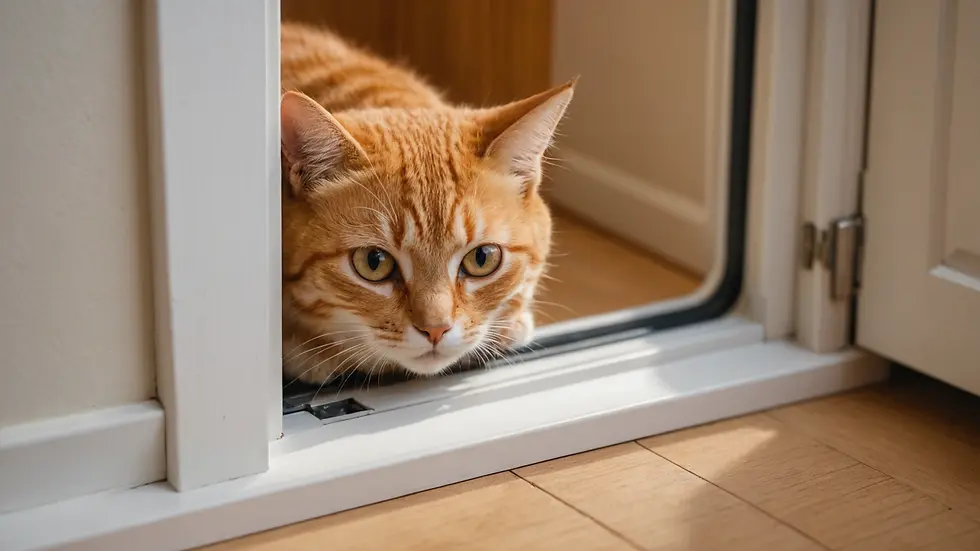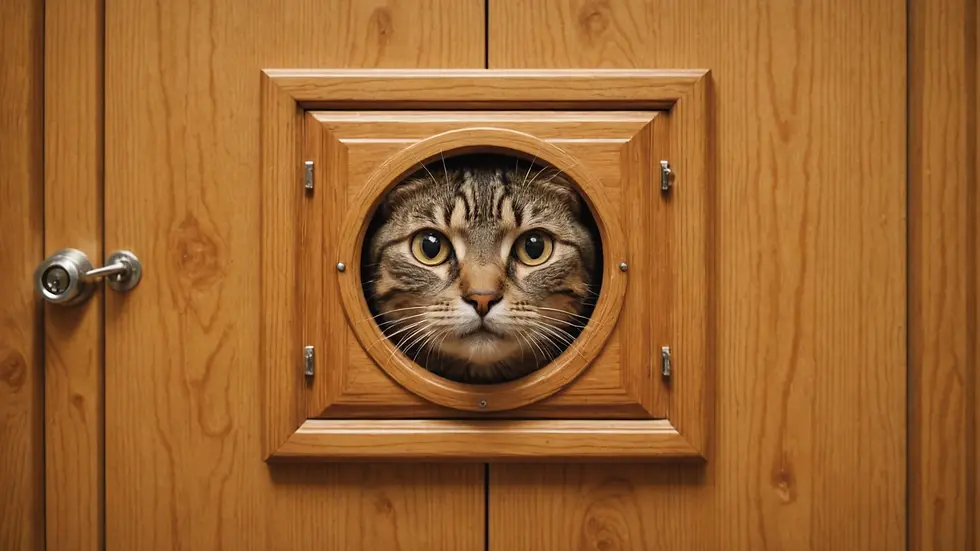How to Install a Cat Door: A Step-by-Step Guide for Pet Owners
- Jyotiraj Borah
- Feb 8
- 5 min read
When you own a cat, creating a comfortable living environment is essential. One of the best ways to achieve this is by installing a cat door. This small feature gives your furry friend the freedom to come and go as they please, whether exploring the outdoors or accessing their litter box. This guide will help you install a cat door, making life easier for both you and your cat.
Benefits of a Cat Door
Installing a cat door not only enhances your cat's freedom but can also reduce stress for both of you. Imagine no longer needing to pause your activities to let your cat in or out.
Increased Independence
Giving your cat their own entrance fosters independence. Cats thrive when they can explore at their own pace. According to a survey by the American Pet Products Association, pets with more freedom inside and outside report higher levels of happiness.
Improved Litter Box Access
If your litter box is in a different room, a cat door allows your cat to access it whenever they need to, promoting better hygiene. Studies show that pet owners place high value on their pet's health and cleanliness, often ranking it as one of their top priorities.
Reduced Disruptions
Without a cat door, interruptions during your daily routines can lead to frustration. A cat door means fewer disruptions as your cat can freely enter and exit when they desire.
Enhanced Security
Many modern cat doors feature locking mechanisms or microchip entry systems. This technology ensures that only your cat can enter your home, effectively keeping out unwanted animals. Research indicates that up to 30% of cat owners report concerns about wild animal encounters.
Choosing the Right Cat Door
Before installing, selecting the right cat door is key. Consider these important factors:
Size
Measure your cat's height and width before deciding on a size. Typical cat doors come in small, medium, and large sizes. For instance, a door designed for a small cat should have a height of approximately 6-7 inches and a width of 5 inches.
Style
There are several styles to choose from. Some doors attach directly to interior doors, while others can be mounted in walls or sliding glass doors. For example, if you own a sliding glass door, a panel cat door may suit you best, allowing easy access for both your cat and you.
Material
It's essential to select a durable material, especially for outdoor doors. Look for options made from tough plastic or metal that can withstand various weather conditions.
Features
Look for helpful features like locking systems or a flap with insulation. These elements are particularly useful if you want to ensure your cat’s safety and comfort while defending against the elements.
Tools and Materials Needed
Gather this list of tools and materials to streamline your installation:
Cat door kit (with instructions)
Pencil
Measuring tape
Level
Jigsaw or cutting tool
Screwdriver
Drill with bit (if needed)
Sandpaper
Safety goggles and gloves
Step-by-Step Installation Guide
With your materials in hand, you’re ready to install the cat door. Here’s how:
Step 1: Select the Location
Find an ideal spot. The cat door must be low enough for your cat to reach easily, and it should not block furniture or other items in your home.
Step 2: Measure and Mark
Carefully measure your cat’s dimensions with a tape measure and mark the cat door dimensions on the intended door or wall. A level will help ensure your markings are straight and even.
Step 3: Cut the Opening
Use your jigsaw or cutting tool to create the opening. Start slowly and follow the marked lines for a precise cut.

Step 4: Smooth the Edges
After cutting, smooth any rough edges with sandpaper. This provides a clean and safe finish for your cat whens transitioning through the door.
Step 5: Prepare the Cat Door
Follow the specific instructions for your cat door, such as attaching the flap or adjusting locks.
Step 6: Insert the Cat Door
Align the cat door with the opening. Make sure it fits snugly and there are no gaps.
Step 7: Secure the Cat Door
Using the screws from your cat door kit, secure the door in place. Tighten without overdoing it to prevent any damage.
Step 8: Test the Door
Before introducing your cat to the new door, test it yourself. Check that it opens and closes smoothly. If there is a locking mechanism, ensure it works properly.
Step 9: Introduce Your Cat to the New Door
Encourage your cat to use the door by showing them how it operates. Placing treats or toys nearby can help lure them through.
Tips for a Successful Installation
To make your installation seamless, keep these tips in mind:
Read the Instructions: Always refer to the manufacturer’s instructions before installation. Following directions can save you time and frustration.
Choose the Right Time: It's best to install the cat door when your cat is calm. A relaxed feline is more likely to explore and adapt to the new addition.
Be Patient: If your cat is hesitant, give them time. Encourage them gently using treats or toys until they feel comfortable.
Check for Proper Fit: After installation, ensure that the door fits well to prevent drafts or entry for pests.
Addressing Common Concerns
Installing a cat door might raise certain concerns. Here are a few and how to handle them:
Security
For worries about others entering your home, consider a cat door with a locking feature. You can choose to keep the door locked during times when you want to ensure no new guests enter.
Damage to the Door
Choosing a durable cat door will help minimize potential damage. Proper installation ensures long-lasting performance.
Transitioning Your Cat
If your cat appears uncertain, let them explore at their own pace. Use treats or toys to create a positive experience.
Maintaining Your Cat Door
To ensure your cat door lasts, consider these maintenance practices:
Regular Cleaning: Clean the door and its flaps periodically to remove dust and debris.
Check Mechanisms: Routinely verify that locking systems and hinges function correctly.
Flap Replacement: Promptly replace the flap if it gets worn or damaged to keep the door effective.
Final Thoughts
Installing a cat door is a rewarding project for pet owners looking to give their cats more independence and comfort. Following this guide will set you up for success in creating an opening that enhances your home. Whether providing better litter box access or added freedom, a cat door can significantly improve your pet's life. You’ve taken a great step toward making your home a happier place for both you and your feline companion!

Always remember, a happy cat contributes to a happy home. With just a little effort, you can offer your kitty the freedom they deserve.




Comments